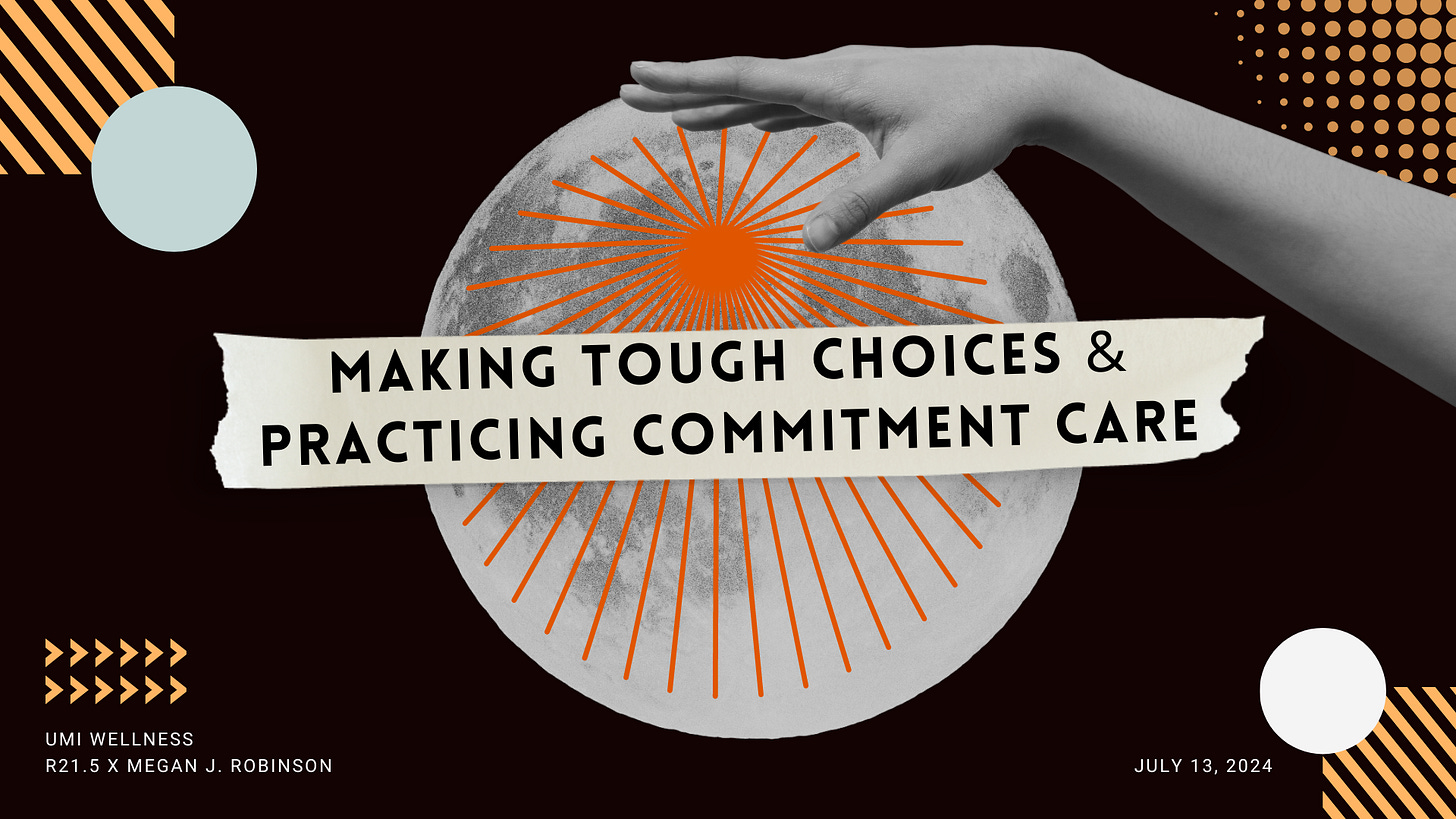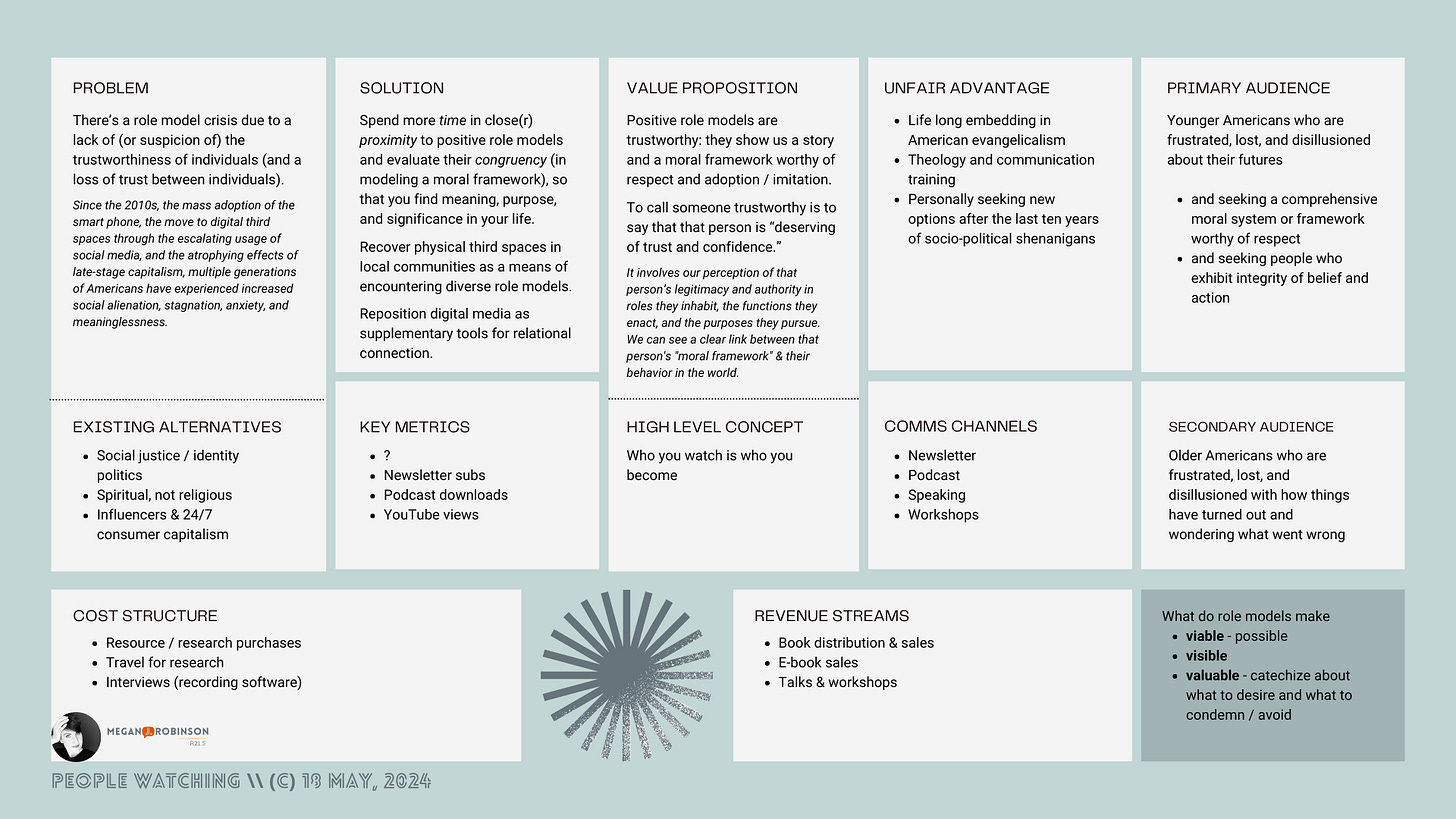Greetings, friendlings!!
I hope this finds you at the end of a satisfying (or at least not enraging) week. Welcome to my off-the-cuff review of efforts, insights, and whatevers in the last few days.
This comes late, as yesterday, I had the unbelievable luxury and privilege of spending a combined seven hours in good conversation with dear friends. Quite frankly, I have an energy hangover today.1 Allons-y.
This week’s notes include:
leading a workshop in July!
the enduring futility of setting weekly priorities and intentions
incremental progress on the core thesis of my book
I'm thrilled to share that I'm leading a workshop with U/mi Wellness Center on July 13th!!
Making Tough Choices & Practicing Commitment Care for Self-Compassion
Commitment Care, rather than project or time management, emphasizes a holistic understanding of our responsibilities, interests, and activities. Commitment Care cultivates discernment (what we say yes to) and discretion (what we say no to), so that we can maintain (or renew) personal integrity in our relationships with the divine, with ourselves, and with others.
In this workshop, participants will clarify their commitment areas, and map their existing commitments. They’ll also categorize their commitments by priority, which enables them to make decisions “ahead of time,” so that they can appropriately respond to new opportunities.
Here's the deets:
🗓️ Saturday, July 13
⏰ 3:00-4:30p EST
🖥️ Online via Zoom
🎁 Free!
Would love to see you there!
Spilling Some TEA
As I’ve learned and worked on personal “productivity” over the last few years, I’ve experimented with various ways of focusing my time, energy, and attention (TEA) in order to get sh*t done. I’ve tried SMART goals, OKRs, KPIs…I don’t even know what all. I get the value of these tactics: they help keep you on track and aware of what needs to happen next, and what progress (and completion) look like.
In the last year or so, I’ve drawn inspiration from the field of permaculture and the concept of holistic management.2 I’ve come to break down my process into a holistic context3 that shapes my overall commitments (the promises I make to show up for things), monthly intentions (how I want to show up for the things), and weekly priorities (what I actually do to show up for the things).
All that said, and yet…
I consistently overestimate what I can get done in a week, and underestimate what I can get done in a month.
And, the reality is that I kinda hate creating “plans.” Also, I’m crap at predicting what needs to, or should, happen, and my energy rarely aligns with my ambition.
I may want to get five things done this week, but that’s only if life as I actually live it somehow magically doesn’t exist. I might have a migraine; I might not sleep for three days.4 Family members need help. Errands need doing, and food needs cooking. Activities always take more time than you think they will.
In fact, the reality of my mismatched TEA and ambition led me to develop the concept of “commitment care,” rather than project/time management. I don’t want to be the person always washing out of opportunities, activities, and relationships. I don’t want to have a reputation as someone who says one thing and does another. I do want to say “yes” and “no” sincerely, and with the practice of consistently showing up well. I want to care for how I live on this side of eternity.
This requires a ruthless honesty about what I’m capable of, and what matters most to me. It means that I often say “no” to opportunities that offer genuine benefit or pleasure, and it means that daily life often looks (and feels, let’s be honest) rather boring. It means that I constantly have to learn to listen to the reality of my life. And the care and cultivation of anything involves the recognition that life is more organic, elastic, and evolving than we’d like to admit.
Progress Comes Dropping Slow
I’ve set myself the deadline of May 31 to complete a crappy first draft of my book outline. That deadline rapidly approaches.
The last four months have involved the “hoovering” stage of research: a massive intake of any and all resources that appear to have relevance for the topics under investigation. The benefit of this stage lies in quickly finding gaps, challenges, and affirmations, but the drawback of it comes in the incessant rabbit trails that feel vital but can also simply waste time.
In the early stages of any research and creative project, I spend a lot of time floundering. It’s hard to trust the process, because floundering feels…well, flounderish. There’s a lot of flailing and wailing and bludgeoning the wall with my head. It feels like quicksand. It feels like the DMV sloth5 in Zootopia.
But one of the things I’ve learned to do as a means of both faking myself out and actually generating insights is to endlessly “slice-n-dice” and rearrange the pieces of my research in as many different ways as possible. I diagram; I sticky-note; I text friends.6 I draw from different disciplines and use seemingly unrelated tools and tactics, such as the Lean Canvas exercise.7 The Lean Canvas is a tool used by start-ups and product developers to quickly validate an idea and see if it can “go to market.”
Forcing yourself to put the various elements of your idea on one page, with limited space, offers clarity on what you’re actually trying to say and the benefit you hope it provides. It also gives you something to start “shopping around” as the foundation for feedback and refinement of the core thesis and goal of the work.
With that preamble, I give you…People Watching: The Lean Canvas. I’d love for you to take a look, and let me know what this sparks for you. Just hit reply and shoot me an email!
And now, off to watch some tv. How’s your week been?
Shalom,
Share
Did this resonate with you? If so, and you think someone else in your life might enjoy it, please feel free to share!
Support
If you liked this issue and want to leave a tip, you can do so here.
You can also support this publication through annual or monthly patronage subscriptions.
Permaculture Research Institute, “Holistic Management and VEG: Part One – Defining the Whole Under Management” & “Holistic Management and VEG: Part Two – Articulating an Holistic Context”
HOLISTIC CONTEXT: Empowers decision making that is socially, spiritually, and economically sound in the short, medium, and long term.
◈ STATEMENT OF PURPOSE / commitments: Captures what the whole was formed to do and thus why it exists.
⟁ WAYS OF BEING / intentions: How you want your life to be based on what you most value as necessary for a good life. Expresses the reasons you’re doing what you’re doing, what you are about, and what you want to become. Clarifies the needs you want to satisfy now, but also the mission you seek to accomplish in the long run. Extends to relationships, challenge and growth, purpose and contribution, and economic wellbeing.
⏀ MEANS OF BECOMING / priorities: What has to happen in your life + work to manifest ways of being and statement of purpose. Specifies what must be true of your day-to-day reality in order to embody your ways of being.
This does happen, though not as frequently as it used to.
Thank you for your patience and encouragement. 😘
Boardmix, “What is a Lean Canvas?”









